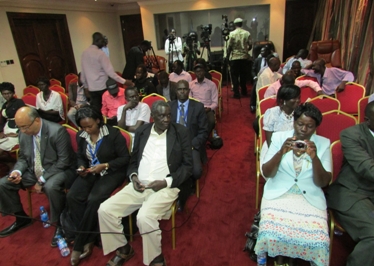Hot in Juba rolls out ethical journalism strategy in S. Sudan
June 10, 2021 (JUBA) – Hot in Juba, a blog run by young South Sudanese journalists has rolled out an ethical strategy to combat emotional and partisan journalism.

South Sudan gained independence from neighboring Sudan in 2011 after a vote on self determination under the 2005 peace agreement which ended the over two decades conflict between the north and south but descended into a dreadful and horrifying situation when political dispute over internal dialogue about reforms within the ruling Sudan People’s Liberation Movement (SPLM) in 2013 morphed in a brutal armed conflict, causing deaths and displacements.
The war also affected media operations, causing members of the civil society and human right organizations and opinion leaders to walk a thin line, between embracing self-censorship and advancing an official view of the government pushing to portray rivals as “power hungry” and people attempting to illegally ascend to power with support of western countries advocating “regime change agenda”.
Public opinion over political arguments are split, with analysts and observers keen to point out that the conflict when it broke out in 2013 drew lines and forced people into groups based on ideological thinking, impacting Media freedom. The biggest deterioration in Africa, according to reporters without borders, a media watchdog puts the country at 140th ranking score, falling 15 places in the Index. In this country torn by civil war since 2013, according to publication on its website, journalists fell victims to violence and a campaign of intimidation by the authorities.
Mariak Bol Majok, a young journalist trained in neighbouring Kenya says he and his colleagues want to change a narrative that focuses on conflict and politics at the expense of other functions of journalism. Media in South Sudan, according to him, have over the past years focused much attention to conflict and politics, issues which are polarizing and leaving out the other positive aspects of journalism.
Majok says he and his colleagues want to disengage youth from focusing on news that polarize the society to news that draw attention to entertainment and inspire knowledge while reporting in a way that makes such coverage and reporting a source of information and education.
After finishing his journalism studies in Kenya, Majok approached his friend whom he identified as Monykuer Juach, then living in Juba with the idea of setting up a news outlet that was different.
“The war in South Sudan which broke out in 2013 after it was just one year old became a source of reports about killings, hunger, and humanitarian crisis. This was what was being reported about the country by international media. When we saw it, we said to ourselves this situation should not be allowed to continue,” explained Majok.
“We need to do something to change the perception and mindset about the role of media in this country and so the founders of Hot in Juba thought of changing the narrative to disengage youth from being lured into joining various warring factions and militias in the country”, he added.
The idea of changing negative impression about the conflict morphed into establishing a Hot in Juba (hotinjuba.com) in 2015 as a news and entertainment blog managed by young journalists and professionals from other discipline who appreciates the value of ethical journalism in the society.
“By then there were only one online news outlet dedicated to the country and accessible to the public. It was Sudan Tribune. It was the only reliable online media reporting mainly about the conflict. Other foreign media covers Juba without giving detailed information. It (Sudan Tribune) would report about conflict, politics, economic activities, governance, and corruption. Whatever was not published by newspapers in Juba would appear on Sudan Tribune. This was what made it popular and drew attention of the authorities, activists, foreign media, and diplomats”, he noted.
Hot in Juba founders thought there were positive things that could change this narrative and they came up with “Hot in Juba”, a perfect name for the city that experiences one of the world hottest temperatures. The name was unique because the words HOT IN JUBA also resonate well with the trending stories in Juba and means the hot temperatures that Juba city experiences in dry season.
The blog started as entertainment and personality news outlet. It became an instant hit before turning into a favorite to many young people tired of hearing only about death and conflict.
It mostly publishes short and brief news updates on social media mainly posted on its Facebook page because it is one of the social media sites regularly browsed by South Sudanese with access and affordable internet connection visit.
Majok identified challenges he and colleagues faces while trying to post news at the site to poor internet connection. They are facing lack of funding, affecting operations and coverage extending to areas beyond the national capital, Juba. The site usually come into conflict with the authorities over stories it publishes, resulting in the arrest of some editors twice, besides numerous threats and intimidation.
South Sudan is ranked 144th out of 180 countries on the World Press Freedom Index. It is a one-place improvement from last year. According to Reporters Without Borders, at least 10 journalists have been killed in the country since 2011.
(ST)
